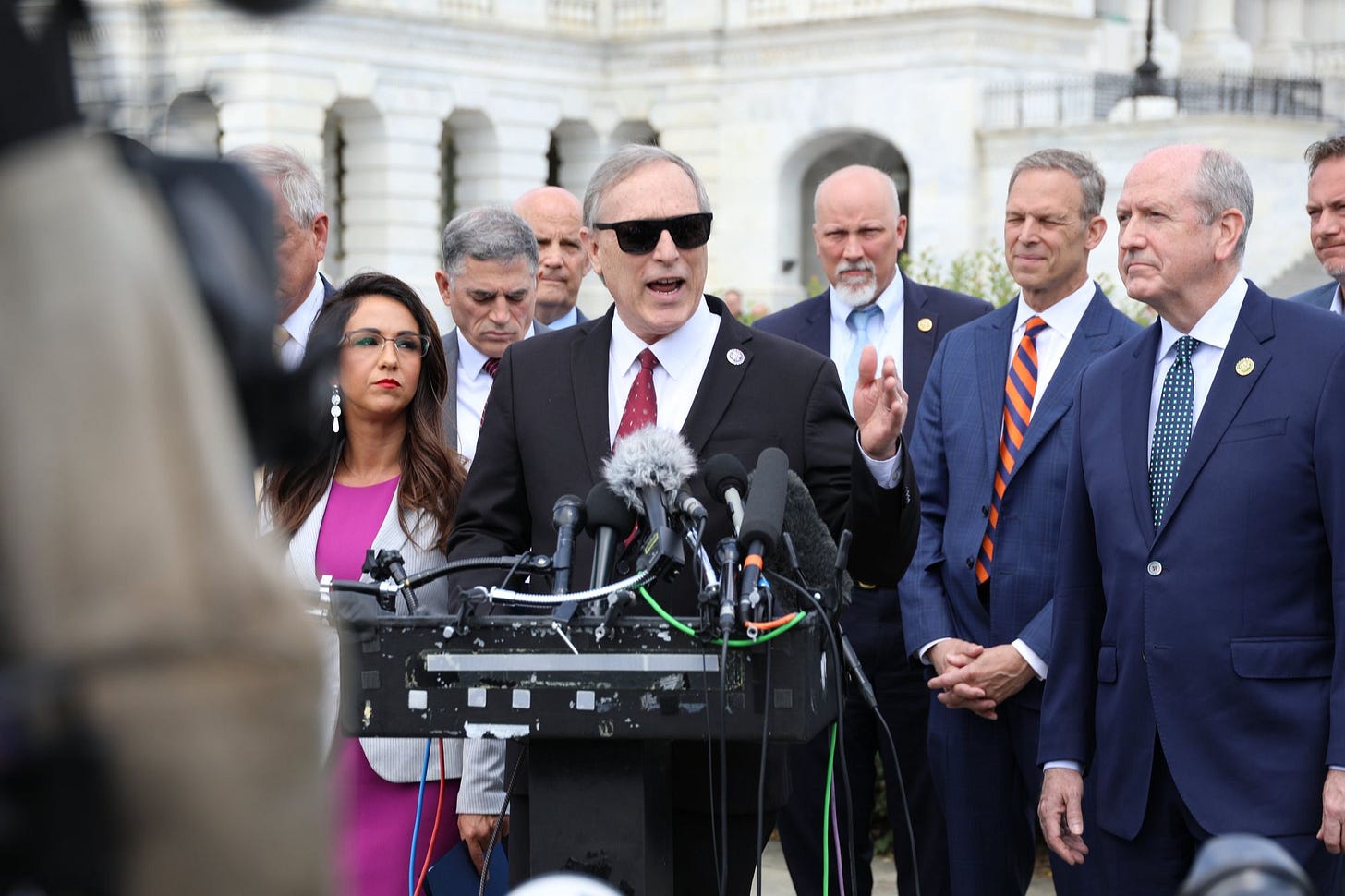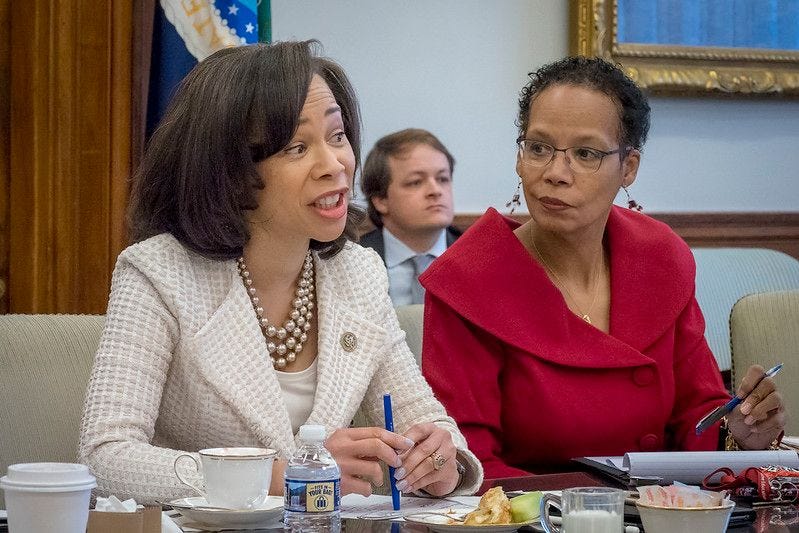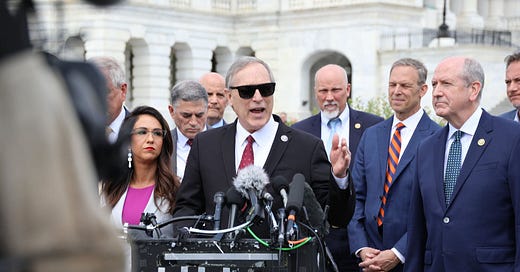McCarthy stares down right-wing revolt
Kevin McCarthy is battling his right-most flank as the debt ceiling bill arrives for a vote in the House.

Good morning! It’s Wednesday, May 31, 2023. The 2024 elections are 524 days away. If this newsletter was forwarded to you, subscribe here. If you want to contribute to support my work, donate here.
The House is set to vote today on the Fiscal Responsibility Act, the debt ceiling deal crafted by President Biden and House Speaker Kevin McCarthy.
Here is the bill text if you want to read it. Here is my summary in yesterday’s newsletter. The topline: The agreement would suspend the debt ceiling until January 1, 2025, while cutting about $1.3 trillion in federal spending over the next decade.
Although the deal is expected to pass, McCarthy will be forced to rely on Democratic votes, a familiar position for Republican congressional leaders during fiscal disputes. House Minority Leader Hakeem Jeffries (D-NY) has said that McCarthy promised him at least 150 House Republicans — about 2/3 of the GOP conference — will support the deal.
The remaining 70 or so votes needed to pass the bill would then come from Democrats.
The key number to watch for McCarthy is 111, which is 1/2 of the House Republican conference. Some members of the right-wing House Freedom Caucus have threatened to try ousting McCarthy over the debt deal, but such efforts would likely fizzle as long as McCarthy can point to support for the package from a “majority of the majority.”
Even opponents of the bill have acknowledged that the package will likely reach that threshold, and coast to passage. “This bill will pass,” Rep. Ken Buck (R-CO), a Freedom Caucus member who plans to vote “no” told CNN. “Some Republicans will vote for it. Some Democrats will vote for it. It will go to the Senate. It will pass in the Senate. It’ll be signed by the president and the United States will not default.”
The measure survived a key obstacle Tuesday night when it was advanced by the House Rules Committee in a 7-6 vote. Although two Republicans (and all Democrats) on the panel opposed the bill, Freedom Caucus member Thomas Massie (R-KY) rescued the package.
So far, at least 34 House Republicans have publicly announced opposition to the deal, according to a whip count by CNN’s Haley Talbot, a number that is expected to grow. Several progressive Democrats have also signaled plans to vote against the measure, including Rep. Alexandria Ocasio-Cortez (D-NY).
Most of the GOP opposition is centered around frustration that McCarthy was unable to secure more sweeping concessions from Biden in exchange for raising the debt limit. “Completely unacceptable,” Rep. Don Bishop (R-NC) said. “Trillions and trillions of dollars in debt, for crumbs. For a pittance.” Rep. Marjorie Taylor Greene (R-GA) likened the deal to a “shit sandwich,” although she said she may vote for it if McCarthy offers her “some good sides.”
According to the Congressional Budget Office, the plan would reduce federal deficits by about $1.5 trillion over the next decade. The CBO has previously estimated total deficits of around $20 trillion for that period.
The CBO also caught lawmakers off guard by projecting that the deal’s changes to the Supplemental Nutrition Assistance Program (SNAP), better known as food stamps, would actually expand — not shrink — the program.
The legislation adds new work requirements for able-bodied, childless SNAP recipients between the ages of 50 and 54. (Work requirements already exist for able-bodied, childless recipients between the ages of 18 and 49.) But the deal also creates entirely new exemptions from work requirements for veterans, former foster youth, and those facing housing instability.
As a result, according to the CBO, SNAP spending would increase by $2.1 billion over the next decade; between 2025 and 2030, when all of the changes will be in effect, an average of 78,000 people are projected to gain SNAP benefits each month. Democrats have celebrated the under-the-radar victory, while Republicans dispute the CBO’s projections.
More news you should know

Ron DeSantis is beginning to step up his criticism of Donald Trump. During his debut campaign visit to Iowa on Tuesday, DeSantis went after Trump for his handling of Covid-19 and failure to enact his promises on immigration policy, among other critiques. “Unfortunately, he’s decided to move left on some of these issues,” DeSantis said. DeSantis has zeroed in on Iowa as a crucial staging ground for his effort against Trump.
A record number of Black female senators could be elected next year due to a trio of open seats, Politico notes. Rep. Lisa Blunt Rochester (D) is the Senate front-runner in Delaware, while Rep. Barbara Lee (D) and Prince George’s County Executive Angela Alsobrooks (D) are leading candidates in California and Maryland, respectively. Two Black women have never served together in the Senate; there are currently zero in the chamber. Only seven Black people have ever been elected to the Senate.
Rep. Chris Stewart (R-UT) plans to resign from Congress due to his wife’s health issues, the Salt Lake Tribune reports. Stewart’s deep-red district is unlikely to change hands, but his departure could scramble the state’s Senate race: he was one of several Republicans eyeing a primary challenge next year against Sen. Mitt Romney (R-UT).
Ask Gabe: Could the Senate have moved first?
John L. asks: “Must the House vote on a debt ceiling bill before the Senate passes a bill? Could the Senate pass a debt ceiling increase, if they get enough Republican votes, without including any budget negotiations? Or must this debt ceiling bill start in the House before it goes to the Senate for a vote?”
There are two dimensions to this question:
Legally, could a debt ceiling bill start in the Senate and then go to the House?
Realistically, does the political will exist in the Senate to move first on the debt ceiling?
The legal question actually lands us in some pretty uncertain constitutional territory. Let’s start with what we know: any bill that raises taxes must be voted on by the House first. Here’s Article I, Section 7, Clause 1 of the Constitution:
All Bills for raising Revenue shall originate in the House of Representatives; but the Senate may propose or concur with Amendments as on other Bills.
Astute readers of the Biden-McCarthy bill will note that nowhere in its 99 pages does it raise taxes. But the House has historically maintained that the “Origination Clause” of the Constitution applies not just to tax bills, but to all “money bills,” including debt ceiling and spending packages. This assertion has never been tested in court, and the Senate has occasionally bucked up against it, but in general both chambers respect the norm that the House gets first dibs on any bill involving fiscal matters.
Clearly, though, that does leave the Senate some room to maneuver if they really wanted to jump into the debt ceiling debate first. (Note: the Senate can also get around the “Origination Clause” simply by taking an unrelated bill passed by the House and amending it with fiscal language, then passing it and sending it back to the House.)
But does the Senate want to do that here? Simple answer: No. Neither party in the Senate has any incentive to pick up the Biden-McCarthy bill before the House. Chuck Schumer has no reason to put his members out on a limb before he’s certain the deal can pass the House. Mitch McConnell is plenty happy with conservative ire over the deal being directed at Kevin McCarthy, which was not the case during the last fiscal debate. Why mess with that now by getting out in front of him?
As for whether the political will exists in the Senate to pass something different than the Biden-McCarthy deal — say, a clean debt ceiling bill — and then send it over to the House, the answer there is no as well. Congressional Republicans are united behind the need for spending reforms; there would not be 10 GOP votes to break a filibuster on a clean bill. How can you be sure? Because Chuck Schumer never tried to put one up for a vote in all these months, a tacit acknowledgment of that reality.
Today’s political planner
President Biden will receive his annual briefing on the upcoming hurricane season and federal preparedness efforts. VP Harris has nothing on her schedule.
The Senate will hold a procedural vote on the House-passed resolution to overturn President Biden’s student loan relief plan. The House will vote at around 8 p.m. Eastern Time on the Fiscal Responsibility Act.
Thanks for reading.
I get up each morning to write Wake Up To Politics because I’m committed to offering an independent and reliable news source that helps you navigate our political system and understand what’s going on in government.
The newsletter is completely free and ad-free — but if you appreciate the work that goes into it, here’s how you can help:
Donate to support my work or set up a recurring donation (akin to a regular subscription to another news outlet).
Buy some WUTP merchandise to show off your support (and score a cool mug or hoodie in the process!)
Tell your family, friends, and colleagues to sign up at wakeuptopolitics.com. Every forward helps!
If you have any questions or feedback, feel free to email me: my inbox is always open.
Thanks so much for waking up to politics! Have a great day.
— Gabe





